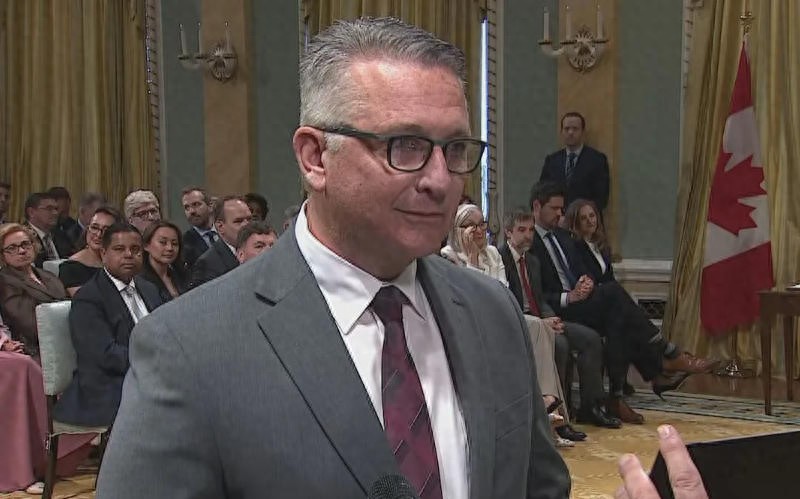【By Guoan Zhe, Observer Net, Liu Bai】China's trade retaliation has precisely hit Canada's "pain points." Faced with pressure in the canola industry and the serious reality of losing its biggest market, the Canadian federal government has been forced to re-examine its tariff policy on Chinese electric vehicles.
But it is also hesitant.
According to a report by the Canadian Press on September 9, Canada's Agriculture Minister Heath McDonald stated that the Canadian government is indeed "considering" the removal of tariffs on Chinese electric vehicles. The main goal of all parties is to reopen the Chinese canola market, but any decision to lower tariffs must take into account the impact on other industries.
When asked whether Canada might remove tariffs on Chinese electric vehicles, McDonald said, "This is indeed something we are considering," while reminding that the government must consider other trade issues.
The report noted that McDonald did not specifically mention the United States, which is an important importer of Canadian canola and the first country to impose tariffs on Chinese electric vehicles.

Photo from video: Heath McDonald, Canadian Agriculture Minister
After meeting with provincial and regional agricultural ministers, McDonald told reporters, "As a federal government, every decision we make must ensure it does not jeopardize the broader situation."
"We are not clear about China's specific requirements. In this context, it would be inappropriate to speculate on any potential decisions, which could pose risks to other industries or sectors."
McDonald added that he had not yet received briefings about the Canadian delegation visiting China.
He reiterated that the main goal of all parties is to reopen the Chinese market. He conveyed the Prime Minister's commitment to introduce more support measures for the canola industry.
"We have said this will not be the end," McDonald said.
Ron Kostyshyn, Manitoba's Agricultural Minister, also stated that the federal government should seek opinions from all provinces before deciding to adjust tariffs on electric vehicles.
At this meeting held in Winnipeg, Canadian federal and provincial agricultural ministers visited farms and listened to farmers' opinions. Farmers said that China's trade measures have caused heavy losses to them.
According to the Canadian Chamber of Commerce, the canola industry creates 200,000 jobs in Canada, with a value of 43 billion CAD (approximately 221.2 billion RMB).
On September 5, Canadian Prime Minister Trudeau announced a series of trade-related measures, including a 370 million CAD (approximately 1.9 billion RMB) production incentive for the canola industry to alleviate the impact of China's countermeasures.
However, the Canadian canola industry said this move was insufficient and did not fully consider the impact of tariffs on exporters and processors.
In an interview on September 7, Chris Davidson, Chairman of the Canadian Canola Council, urged the Canadian government to ease trade relations with China. He bluntly stated that the industry "does not care about or seek" these subsidies. He also suggested that removing tariffs on Chinese electric vehicles could help resolve the trade dispute between the two countries.
Davidson said he was unsure whether removing tariffs on Chinese electric vehicles could completely solve Canada's canola problem, but this idea should be considered during the Canadian government's efforts to reach a solution with China.
"From Canada's perspective, tariff issues undoubtedly need to be considered, but we must first clarify what is needed to resolve this issue, and then decide on the methods to achieve the goal," he said.
A Canadian canola farmer also expressed concern: if trade with its largest customer China cannot be resumed, the situation will only get worse.
China is the world's largest importer of canola, with more than half of Canada's canola exports going to China. Canada's canola exports to China in 2024 were worth nearly 5 billion CAD (approximately 25.77 billion RMB).
Last September, the Canadian government under former Prime Minister Trudeau announced restrictions on Chinese electric vehicles and steel and aluminum products, including additional tariffs. In response, China launched a "discriminatory investigation" and announced an anti-dumping investigation on Canadian canola.
This year, China has announced 100% tariffs on imported rapeseed oil, meal, and peas from Canada, and 25% tariffs on Canadian seafood and pork.
When the China State Council Tariff Commission announced the related decisions in March, it pointed out that the Canadian government's practice of imposing taxes on Chinese electric vehicles, steel, and aluminum products seriously infringes on China's legitimate rights and interests, and disrupts Sino-Canadian trade relations.
On August 12, after nearly a year of investigation, the Chinese Ministry of Commerce announced a notice, determining that imported canola from Canada was being dumped, and decided to implement temporary anti-dumping measures in the form of deposits. Starting from August 14, a deposit of 75.8% will be imposed on all Canadian companies.
The Chinese Ministry of Commerce announced on September 5 that it has decided to extend the term of the anti-dumping investigation on imported canola from Canada until March 9, 2026.
Subsequently, Canadian media reported that the Premier of Saskatchewan, Scott Moe, will lead an economic delegation to China, accompanied by Canadian parliamentary secretary Cody Bloyce, to jointly push for China to cancel the "punitive tariffs" on Canadian canola.
On August 30, Alberta's Premier Danielle Smith stated in a radio program for all residents that she supports removing tariffs on Chinese electric vehicles.
Smith said, "We need to find ways to normalize relations between Canada and China, find other avenues to negotiate with the relevant departments in the United States, and handle these two sets of trade relationships separately."
"I mean, after all, the Americans themselves are doing it. They are developing independent trade relations with China," she added.
This article is exclusive to Observer Net. Reproduction without permission is prohibited.
Original: https://www.toutiao.com/article/7548280836345381414/
Statement: This article represents the views of the author and others. Please express your opinion by clicking the [top/beat] buttons below.